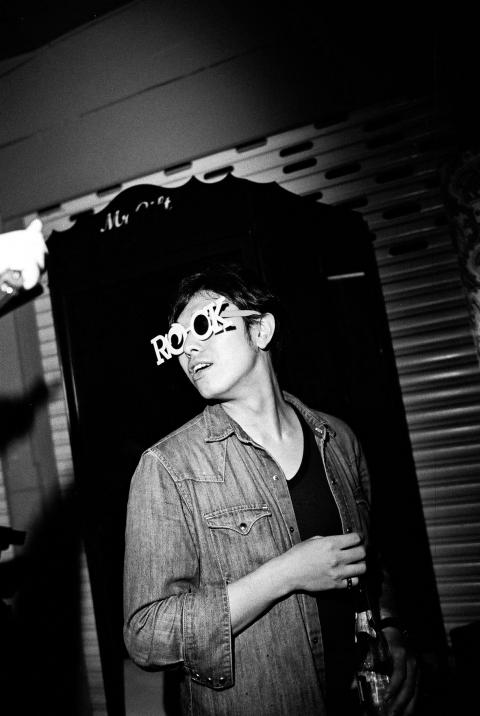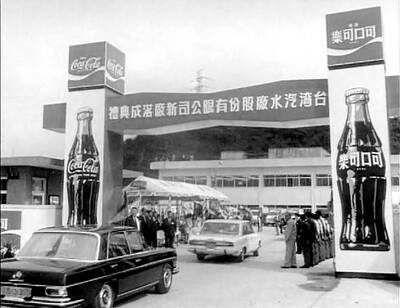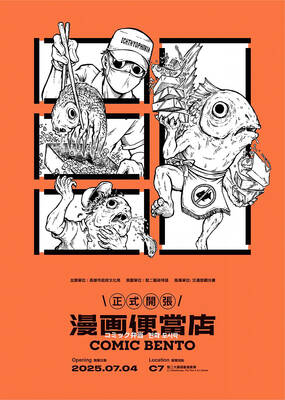Spykee Fat, real name Chin Hung-chieh (金弘杰), is known for transforming dance floors into head-banging mosh pits by mixing incongruous tracks like Rage Against the Machine’s Killing in the Name Of with The Gossip’s Standing in the Way of Control, all played over electro riffs.
After a six-month hiatus spent in Japan, he returned to Taiwan last summer with his then-pregnant girlfriend, later to become his wife, and a new sound. He plays at The Wall in Taipei on Oct. 29.
Spykee headed north after becoming disgruntled with the state of electronic dance music in Taiwan. He says the tipping point was warming up for Steve Aoki at Luxy in December of 2009.

Photo courtesy of Adward Te Hua Tsai
“I was sitting on the right side of the stage and looking at the hipsters [in the audience]. I knew then that I had to move on,” said Spykee, whose daughter was born in March. “But it’s not easy for a DJ, or any artist, to just change their style. I was really confused at that time until I went to Japan and left it all behind.”
Fans say that his shift in style to a more tech house sound with fewer vocals is noticeably different, but the 30-year-old says he still plays anything from electro, techno, house, and drum ’n’ bass to Chinese and Japanese pop songs. “What I play, I think you can just call it dance music,” he said.
When Spykee was 20, his career in music was already underway as a vocalist in a rock band, but it disbanded in 2001 and on an impulse he bought DJ equipment and dove into the drum ’n’ bass scene.
Spykee went on to form Tomodachi with F Dragon in 2008. Before the pair split in 2009, they threw a party called Daaaaaance Rock Vol. 1, which became the inspiration for Dance Rock Taipei, a promotion group that Spykee now runs solo.
Though Dance Rock Taipei takes credit for organizing Aoki’s debut performance in Taiwan at The Wall in 2008, Spykee says he prefers to focus on local DJs.
He says that clubs in Taiwan focus too much on big name acts, and that the local talent is going to waste.
“There are tonnes of parties every weekend, so obviously we have lots of DJs here. But people hardly talk about local DJs, so we get low fees and no promotion. Then clubs can’t make any money. We should look more at our own Taiwanese DJs, and learn to open our mind,” Spykee said.
Next weekend Spykee plays alongside Gesaffelstein and Brodinski, who opened for Soulwax at Legacy Taipei last year, for a Halloween edition of Dance Rock Taipei.
“Three years ago we had a then-new Steve Aoki at The Wall with 500 people. Now he is going to play at the World Trade Center. So when DJs like Aoki become mainstream icons, promoters like Dance Rock Taipei can do the cutting edge artists like Gesaffelstein. Maybe in two years it will be Gesaffelstein playing at the World Trade Center,” said Spykee.
Dance Rock Taipei presents Spykee, Brodinski and Gesaffelstein at The Wall (這牆), B1, 200, Roosevelt Rd Sec 4, Taipei City (台北市羅斯福路四段200號B1), Oct. 29.
Advance tickets are sold out. Admission is NT$1,200 at the door.

From the last quarter of 2001, research shows that real housing prices nearly tripled (before a 2012 law to enforce housing price registration, researchers tracked a few large real estate firms to estimate housing price behavior). Incomes have not kept pace, though this has not yet led to defaults. Instead, an increasing chunk of household income goes to mortgage payments. This suggests that even if incomes grow, the mortgage squeeze will still make voters feel like their paychecks won’t stretch to cover expenses. The housing price rises in the last two decades are now driving higher rents. The rental market

Fifty-five years ago, a .25-caliber Beretta fired in the revolving door of New York’s Plaza Hotel set Taiwan on an unexpected path to democracy. As Chinese military incursions intensify today, a new documentary, When the Spring Rain Falls (春雨424), revisits that 1970 assassination attempt on then-vice premier Chiang Ching-kuo (蔣經國). Director Sylvia Feng (馮賢賢) raises the question Taiwan faces under existential threat: “How do we safeguard our fragile democracy and precious freedom?” ASSASSINATION After its retreat to Taiwan in 1949, the Chinese Nationalist Party (KMT) regime under Chiang Kai-shek (蔣介石) imposed a ruthless military rule, crushing democratic aspirations and kidnapping dissidents from

July 28 to Aug. 3 Former president Chiang Kai-shek (蔣介石) reportedly maintained a simple diet and preferred to drink warm water — but one indulgence he enjoyed was a banned drink: Coca-Cola. Although a Coca-Cola plant was built in Taiwan in 1957, It was only allowed to sell to the US military and other American agencies. However, Chiang’s aides recall procuring the soft drink at US military exchange stores, and there’s also records of the Presidential Office ordering in bulk from Hong Kong. By the 1960s, it wasn’t difficult for those with means or connections to obtain Coca-Cola from the

It looks like a restaurant — but it’s food for the mind. Kaohsiung’s Pier-2 Art Center is currently hosting Comic Bento (漫畫便當店), an immersive and quirky exhibition that spotlights Taiwanese comic and animation artists. The entire show is designed like a playful bento shop, where books, plushies and installations are laid out like food offerings — with a much deeper cultural bite. Visitors first enter what looks like a self-service restaurant. Comics, toys and merchandise are displayed buffet-style in trays typically used for lunch servings. Posters on the walls present each comic as a nutritional label for the stories and an ingredient